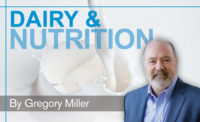Dairy could capitalize on anti-inflammatory trends
Recent studies show some dairy products reduce inflammation

People are interested in foods that can decrease inflammation. According to consumer insights from The Hartman Group, Bellevue, Wash., contemporary diets are personalized and all about balance, wellness and energy. This includes a consumer desire for diets that reduce inflammation.
While the desire to reduce inflammation may be a consumer trend, clinicians are also starting to look at markers of chronic inflammation as signs of heart disease and type 2 diabetes. And, there’s growing evidence that certain dairy foods are linked to reduced chronic inflammation.
What’s inflammation anyway?
Let’s take a closer look. While acute inflammation is the body’s natural response to injury or infection, when we talk about dairy or any other foods in the context of inflammation, we are talking about low-grade chronic inflammation. Persistent low-grade inflammation can alter the body’s natural functions and processes and is linked to metabolic disorders such as heart disease and type 2 diabetes.
While it is an emerging area of science, research has shown that eating dairy foods as part of nutrient-rich eating patterns is not tied to inflammation and may, actually, be associated with reduced inflammation. In fact, part of this connection with dairy and inflammation may make sense when you think about the research that has been unfolding over the past decade linking dairy foods with a reduced risk of cardiovascular disease and type 2 diabetes. These are both metabolic diseases that often result — at least partially — from chronic low-grade inflammation.
Health benefits of dairy
A recent multicenter randomized crossover study conducted among Canadian adults with low-grade systemic inflammation found that short-term consumption of a combination of low- and high-fat dairy products as part of a healthy eating plan had no adverse effects on inflammation.
Additionally, two studies published in the past year by the University of Wisconsin – Madison and funded by National Dairy Council showed a link between yogurt and a reduced risk of inflammation. The studies used the same clinical trial to show the link. The first study was a sub-study of the larger study, and it showed that eating 8 ounces of low-fat yogurt prior to a high-fat, high-calorie meal reduced inflammation markers and improved glucose metabolism in women.
The larger study was a nine-week clinical trial that showed that eating one and a half servings of low-fat yogurt a day (in addition
to usual dairy intakes, but no more than four total dairy servings per day) reduced biomarkers of chronic inflammation and improved indicators of intestinal barrier function (i.e., keeping good stuff in and letting bad stuff out) in women.
Indeed, the totality of the evidence supports a role for dairy foods in reducing inflammation. A systematic review of over 50 clinical trials showed that dairy foods were associated with anti-inflammatory activity in subjects with metabolic disorders. Furthermore, both low- and full-fat dairy products, as well as fermented dairy foods, displayed anti-inflammatory activity.
Though anti-inflammatory eating plans are gaining popular attention, combatting chronic inflammation involves more than individual nutrients or foods. It’s about having an overall healthy eating pattern and lifestyle and maintaining a healthy weight, among other factors. The available research so far seems to indicate that dairy foods can be part of such a lifestyle.
Looking for a reprint of this article?
From high-res PDFs to custom plaques, order your copy today!







